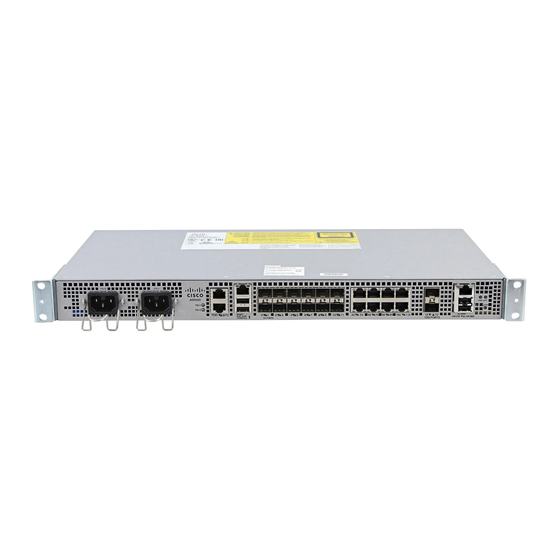Cisco ASR-920-4SZ-D Podręcznik konfiguracji - Strona 3
Przeglądaj online lub pobierz pdf Podręcznik konfiguracji dla Przełącznik Cisco ASR-920-4SZ-D. Cisco ASR-920-4SZ-D 13 stron. Aggregation services router
Również dla Cisco ASR-920-4SZ-D: Instrukcja instalacji sprzętu (46 strony)

Restrictions for Autonomic Networking
General Restrictions
• Autonomic networking only supports unique device identifier (UDI)-based devices.
• Autonomic networking and Zero Touch Provisioning (ZTP) are different zero touch solutions. It is recommended that you do
not test or use autonomic networking and ZTP at the same time.
Information About Autonomic Networking
Overview of Autonomic Networking
The aim of autonomic networking is to create self-managing networks to overcome the rapidly growing complexity of the Internet
and other networks to enable their further growth. In a self-managing autonomic system, network management takes on a new role:
instead of controlling the network elements individually and directly, the administrator defines network-wide policies and rules that
guide the self-management process.
The following diagram provides a high-level architecture of an autonomic network.
Figure 1: High-Level Architecture of an Autonomic Network
Autonomic Networking is controlled by a separate software entity running on top of traditional operating systems that include
networking components, such as IP, Open Shortest Path First (OSPF), and so forth. Traditional networking components are unchanged
and unaware of the presence of the autonomic process. The autonomic components use normal interfaces that are exposed by the
traditional networking components and interact with different devices in the network. The autonomic components securely cooperate
to add more intelligence to devices so that the devices in an autonomic network can autonomically configure, manage, protect, and
heal themselves with minimal operator intervention. They can also securely consolidate their operations to present a simplified and
abstracted view of the network to the operator.
3
